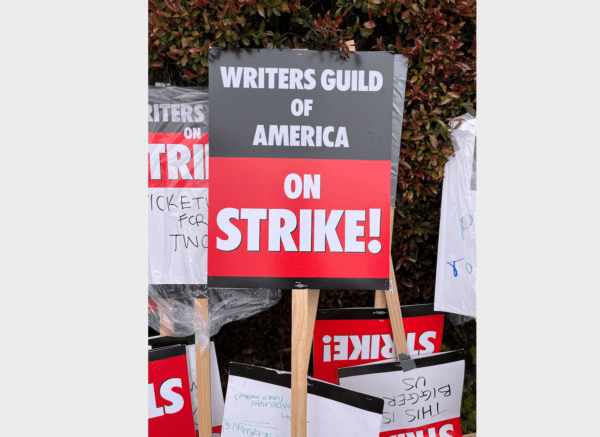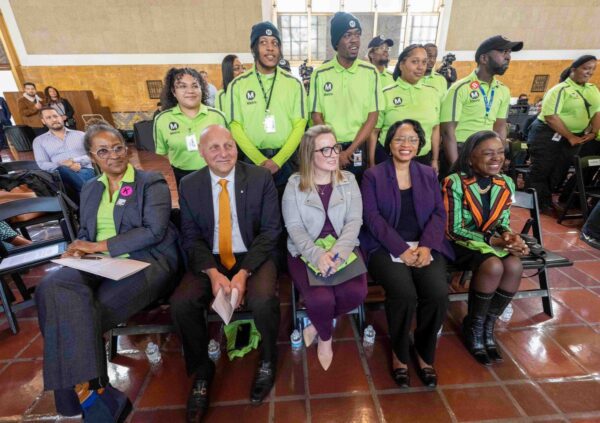As the Writers Guild of American strike enters its second week Monday, the status of television showrunners, who are often writers as well as producers, has emerged as one of the latest wrinkles in the dispute with studios.
A group of showrunners met Saturday at the WGA Theater in Beverly Hills, a day after Disney, HBO, Warner Bros. and several other studios sent letters saying they would be required to continue doing their nonwriting duties during the strike — even if it means crossing WGA picket lines, according to multiple media reports.
A Wednesday letter from Disney’s ABC Signature read in part: “Your duties as a showrunner and/or producer are not excused, suspended or terminated until and unless you are so notified in writing by the Studio,” the entertainment website IndieWire.com reported. “Studio intends to stay in production during the WGA strike and we are legally entitled to do so.”
WGA’s contract negotiating committee has advised showrunners to stop doing their nonwriting duties, which also includes promoting their shows and attending various industry events, until the strike is settled.
“It’s as simple as we are at war with the studios,” one showrunner told the Hollywood Reporter. “We can’t be at war one day and be their partners the next. If we’re going to a ‘For Your Consideration [Emmy]’ event, we’re being their partners. It’s kind of impossible to separate your producer brain from your writer brain. Everything really is writing, especially when you’re a showrunner.”
Although several who attended Saturday’s reportedly packed meeting described the studio letters as “scary,” they vowed to remain united as the strike pitting writers against the Alliance of Motion Picture and Television Producers, which represents the studios, in a battle over residuals for streaming content, staffing levels in writing rooms and the use of artificial intelligence continues — among other issues.
“Those studio emails have had the opposite intended effect now,” one showrunner at the Saturday meeting told Deadline.com. “Now we are more united, more convinced than ever that there is no non-writing aspect of what we do.”
The strike, which began early Tuesday, May 2, has halted television and other productions on both coasts, including forcing late-night programs into reruns, and cancellations of “Saturday Night Live” for at least the next few weeks.
Sunday’s MTV Movie & TV Awards canceled plans for a star-filled live ceremony in Santa Monica, which writer’s were planning to picket, and will instead present a taped show.
Production has also shutdown on Netflix’s “Cobra Kai” and the animated “Big Mouth,” ABC’s Emmy-winning “Abbott Elementary,” Showtime’s “Yellowjackets” and the Marvel film “Blade,” a vampire thriller starring Mahershala Ali, among other productions.
Meanwhile, WGA writers and their supporters continue picketing outside studios throughout the Los Angeles area, walking the lines in shifts from 9 a.m. to 1 p.m. and 1 to 5 p.m. where they are often joined by actors and other celebrities.
As writer’s, many have used their skills to craft creative picket signs including such messages as “Succession without writers is just The Apprentice,” “I like your offer as much as you like an angry female lead” and “Do the write thing.”
Local picketing has been conducted at Amazon’s Studio in Culver City, CBS’ Studio City lot, Television City, The Walt Disney Co.’s corporate headquarters and Warner Bros. in Burbank, the Fox Studios lot, Netflix’s Hollywood headquarters, Paramount Studios in Hollywood, Sony Studios in Culver City and Universal Studios.
There was no word of any new labor talks scheduled between the WGA and the AMPTP with some observers saying the strike could last for months.
This is the first WGA strike in 15 years, a work stoppage which lasted from November 2007 until February 2008.
The WGA is specifically calling for higher residual pay for streaming programs that have higher viewership, rather than the existing model that pays a standard rate regardless of a show’s success.
The union is also calling for industry standards on the number of writers assigned to each show, increases in foreign streaming residuals and regulations preventing the use of artificial intelligence technology to write or rewrite any literary material.
WGA officials say on the union’s website that writers “are facing the most comprehensive assault on compensation and working conditions that they have seen in a generation.”
“The studios have taken advantage of the transition to streaming to underpay entertainment industry workers, including writers in every area of work,” according to the union. “Like too many working people across our economy, as corporate profits grow, writers are just not keeping up.”
The AMPTP issued a position paper Thursday outlining its take on some key negotiating points in the labor impasse. Responding to a union demand for minimum staffing levels and employment guarantees, the alliance contends such a move would “require the employment of writers whether they’re needed for the creative process or not.”
The alliance also pushed back on the issue of streaming residuals, saying the union’s most recent contract gave writers a 46% increase in streaming residuals taking effect in 2022 — increases that some writers may only now be seeing in their paychecks. The alliance contends the union’s proposal would represent a 200% increase over current residual rates.
It also called for “a lot more discussion” on the issue of artificial intelligence, and suggesting that writers “want to be able to use this technology as part of their creative process, without changing how credits are determined.”
“The AMPTP member companies remain united in their desire to reach a deal that is mutually beneficial to writers and the health and longevity of the industry, and to avoid hardship to the thousands of employees who depend upon the industry for their livelihoods,” according to an alliance statement issued May 1. “The AMPTP is willing to engage in discussions with the WGA in an effort to break this logjam.”
On Thursday, Paramount Global CEO Bob Bakish said the company had been preparing for a WGA walkout and believes viewers won’t see any major impact “for a while.”
“Writers are an essential part of creating content that our audiences enjoy, really across platforms,” Bakish said. “And we hope we can come to a resolution that works for everyone fairly quickly. But it’s also fair to say there’s a pretty big gap today.
“Obviously, we’ve been planning for this. We do have many levers to pull and that’ll allow us to manage through this strike, even if it’s for an extended duration. In terms of those levers, we have a lot of so-to-speak content in the can. So with the exception of things like late-night, consumers won’t really notice anything for awhile.”
He said the studio also has a wealth of “reality and unscripted” content, as well as sports programming.
“Plus we have offshore production, which we’ve been moving to leverage pre-strike,” he said.
Outside Paramount Studios in Hollywood on Thursday, a striking WGA member acknowledged Bakish’s take on the walkout, but noted additional pressure will fall on the studios when labor talks begin in the coming weeks with the Directors Guild of America and SAG-AFTRA actors’ unions.
“At a certain point they will run out of content,” writer/producer Peter Paige told KNX News outside Paramount Studios. “At a certain point there will be no more content. We’ve got the DGA negotiations coming up shortly and SAG follows right after that. And we’re all facing the same existential issues, where it’s no longer possible to make a living, a decent living … in this business. So something’s got to give.”
The strike is also expected to have a wide-ranging economic ripple effect on thousands of crew members and other behind-the-scenes workers — as well as impact businesses near studios such as restaurants that typically serve workers.
The WGA last went on strike in 2007-08, remaining off the job for 100 days and grinding Hollywood production to a halt. That strike was precipitated over compensation for what was then termed “new media,” with Internet streaming beginning to reshape the entertainment landscape.
Various estimates from different organizations estimated that the 100-day strike cost the local economy between $2 billion and $3 billion.







